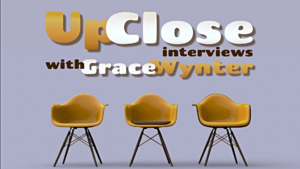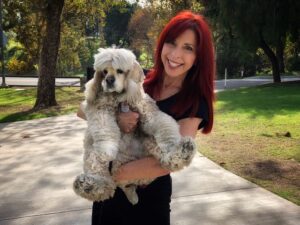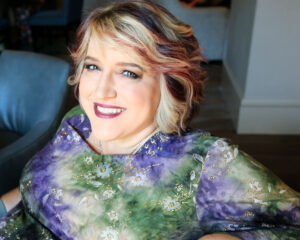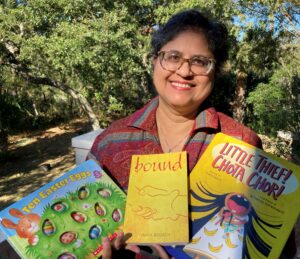Posts by Grace Wynter
Greetings, WU Family. In my first post of the year, I’m introducing you to Ann Michelle Harris. Ann Michelle is an attorney by day, and at night, she writes romantic suspense and fantasy/speculative fiction with diverse characters and positive social justice themes. In today’s Q&A, she shares how her work in the areas of poverty, abuse, and child welfare guides her, how that work inspired her novel, North, and why she feels building community is one of the most important things a writer can do for their career.
GW: One of my favorite parts of this series is learning about an author’s origin story: the thing that propelled you from someone who only thought about writing to someone who actually wrote and has a book out. So, what’s your author origin story—in other words, why did you start writing and keep writing?
AMH: I have loved reading adventure stories since I was very young. I was an English major at Penn so I loved not just stories but also story analysis, themes, and structure. Several years ago, I went through a stressful time in my life and began immersing myself in escapist stories as a form of comfort. After months of consuming other people’s stories, I decided to become a contributor of short stories to a public writing forum. Positive responses convinced me that I might have a larger story worth telling and that I could be brave enough to take the risk to try to tell it. I specifically wanted to write an adventure story in honor of my children. Shortly after this, the pandemic came and gave me even more stress but also much more time to write since I no longer had to spend hours commuting to the office each day (and it gave me plot inspiration). That extra time allowed me to dig deeper into creating a full manuscript and begin the process of querying.
GW: Can you tell us about your path to getting North published?
AMH: After completing my manuscript, I began to query it to a few agents and independent publishing houses. I got rejections, but one rejection from a large indie press had detailed feedback about the plot (particularly the ending) and that helped me tweak some elements. I also worked with a developmental editor, a beta reader, and a critique group to fine-tune the scene structure and build more tension in the story arc. By then, I had heard from a few writers that it is sometimes more accessible to directly find a publisher than to find an agent. I had another historical gothic manuscript that was getting a lot of traction with agents, but I decided to pitch North to a small press at a writing conference, and they loved it after reading the full story. After I signed the publishing contract, I continued to fine-tune the manuscript and then worked with the publisher for editing, galleys, and cover design. I tweaked everything until it was ready for submission to the distributor, and then finally it went into pre-order. I used my pre-launch time to promote the book online, connect with readers, and lean heavily on the wisdom of my more experienced writer colleagues, who were incredibly supportive. Then the big day came […]
Read MoreWhen all else fails, we write. We tell stories. Then we revise them. And then we revise them again, and again. And if you’re anything like me, again. And during all that time, the world keeps spinning, burning in some places, healing in others, hungry, even ravenous for escape, understanding, empathy. And so we write. Or we at least try to. Which brings me to this year in review summary and the encouragement I hope you’ve received from the advice shared in my Up Close column. Over the past year, I’ve had the good fortune of interviewing a number of publishing professionals. From a successful self-published author to a former acquisitions editor, and everything in between, their advice shared a common thread: keep going, keep querying, keep writing. So here’s a review of the best advice from Up Close this year.
Terra Weiss, Author of the Wingmom Series: Advice for writers considering self-publishing
Ask yourself the important questions. The first one is whether you want to make writing into a career or not. If the answer to that is yes, then the second is whether or not you want to be an entrepreneur because, as you’ve learned, successful self-publishing means running a business, not just writing books.
The third is if you are—deep down in your heart—okay with writing to market. Some people lose the joy of writing if they have to fit their books into a genre or trope. Which is fine, but it may mean you need to pursue the trad route. The fourth question is whether you can produce books on a tough schedule, around 3-5 books a year. This means you’re spending about a month on drafting, a month on editing, a month giving it to critique partners, betas, and editors, and a month on allowing advanced readers to have it and review it. Also ask yourself if you’re an “I’ll figure it out” type of person because you’ll be scrambling to learn something new every day, whether it be the latest technology, understanding the updated rules for sending newsletters, or how to reposition your books or marketing strategy to fit in the current market, which shifts almost overnight.
Finally, read books that are like yours. This one sounds simple, but so many authors aren’t reading their successful comp authors, which means they’re unaware of what the standards are in their genre. It’s impossible to do anything well if you don’t know the target you’re aiming for.
Read MoreGreetings, WU Family! Today’s Up Close Q&A features fellow author, editor, and friend Margeaux Weston. I first got to know Margeaux when we were both a part of Sourcebooks’ BIPOC Editorial Training Program. Even back then, Margeaux displayed a keen eye for shaping stories, so I wasn’t surprised when she soon landed an agent, published a non-fiction title with Hachette, and became an acquisitions editor. Today Margeaux shares the wisdom she’s gained along her journey and provides a valuable behind-the-scenes look at the publishing industry.
GW: I’m a fan of origin stories, and though origin stories are usually used to describe superheroes, I love to use the term with published authors. What’s your writer-to-published-author origin story for your debut book?
MW: I love a good origin story as well! Interestingly enough, I started out writing pop culture articles for websites like Ebony Magazine and Paste. In 2020, on the heels of the George Floyd protests, publishers posted openings for for-hire writers. I applied and within a few months I was writing nonfiction books for young readers. It grew from there, and I soaked up all the information I could find about writing and getting an agent. I had a small list of agents I planned to query, including one I really wanted to work with. Two years later, that agent, Eric Smith, tweeted about wanting more nonfiction authors. I sent him my website and talked about my passion for writing for young readers. By that time, I had a few books under my belt and one that was pretty successful. We met and he became my agent soon after.
My journey is a tad bit different than what you’d expect in the querying process. Nonfiction is vastly different from fiction, and obtaining representation is often based on having a specialty or niche style or reputation. Once I had representation, I worked on polishing my proposal. In nonfiction writing, an agent pitches a proposal that includes market research, background information on the author and subject, and chapter samples. Publishers have to envision the “story” and have faith that the writer can deliver. Since becoming agented I’ve published an adaptation, Malcolm X and Muhammad Ali: The Fatal Friendship and have an upcoming nonfiction middle grade book with Bloomsbury.
GW: What do you think was the key(s) to getting that publisher to express interest in your manuscript—in other words, what made your manuscript stand out among hundreds of others?
MW: I’d say it’s a combination of timing and content. I worked in traditional publishing, so I know there are so many amazing manuscripts that come in, but they’re just not the right fit. It could be that the topic isn’t selling as well as it did a few years ago or it’s not what the publisher is looking for at the time. My upcoming nonfiction book with Bloomsbury is about neurodivergent people who shaped the world. That proposal sold at auction, and I believe that happened because the topic is timely and the content has a large appeal.
Read MoreGreetings, WU family! I’m pleased to be back with the latest in my Up Close series—a series designed to provide insight into the publishing industry from various stakeholders, including authors, agents, publishers, and today’s guest, a media strategist. A veteran of the publishing industry, Linda A. Duggins is the former Senior Director of Publicity at Grand Central Publishing/Hachette Book Group where she led successful national campaigns for authors such as Tayari Jones, Jane Goodall, and the late Octavia E. Butler. In her current role as an Independent Media Strategist, Linda helps authors identify their books’ key selling points and teaches them how to leverage media opportunities to build awareness and boost sales. In today’s Q&A, Linda offers valuable insight into crafting a clear and compelling message about your books and your writing.
GW: Thank you for agreeing to this Q&A. First, can you tell us a bit about your career in publishing as it relates to media and publicity?
LD: There has never been a time that I did not enjoy talking about books. Spreading the word about amazing reads that keep me up at night or make me think well beyond the last page has been an ongoing experience for me. Prior to my publicity role at Grand Central Publishing, as co-founder of the Harlem Book Fair, I spent a considerable amount of time pitching various stories about the book fair, the authors and their books, and information about the various organizations that supported the work around what the book fair entailed. I was that person on the subway in NYC passing out upcoming book event postcards and advanced reader copies to just about anyone who dared to look at me. The organic transition to becoming an in-house book publicist was challenging and very exciting. Getting the media and booksellers to pay close enough attention required strategy, effective people skills, perseverance, timing, and luck. There was plenty of reading, book campaign strategizing, meeting media professionals, book tour planning, and engaging with book club members as well as booksellers and librarians. It’s really a blended affair, with collaboration inside the publishing house as well, with editors, marketers, the creative team, sales, audio, and many others.
GW: What exactly is media training and how does it relate to authors, both self-published and traditionally published?
LD: Media training is a form of communication coaching designed to help an author navigate interactions with the media to effectively convey their message, handle interviews, and manage conversations about various topics including: the author’s backstory, writing career, and book details, just to name a few. With media training, the goal is to help authors learn how to keep the title of their books and the key selling points up front and top of mind during interviews.
Read MoreWhen I first met today’s featured author, I had just started writing (very bad) fiction and was looking for other writers who were less bad at it than I was. I created a Meetup group, set up a meeting date, and waited. On that first day, only one person showed up: Terra Weiss. We’ve been friends ever since. In the almost ten years that have followed, Terra’s paid close attention to the publishing industry and adapted to its changes, all while honing her craft. Now she’s a successful indie author of six full-length novels that have received hundreds of glowing reviews across Amazon and other platforms. (Her novel Wingmom has over 500 reviews to date!) Whether your goal is traditional publishing, indie publishing, or something in between, if you’re interested in writing as a career, Terra’s interview provides a wealth of knowledge, and I’m beyond delighted to introduce her to the WU community today.
GW: Thanks for agreeing to share your writing and publishing experiences with the Writer Unboxed community. Can you tell us what genre you write in and when and why you started writing?
TW: Thank you so much for inviting me to be a guest here at Writer Unboxed. I’ve been reading and learning from your articles for years, and I’m honored to be able to share some of my experiences and hopefully give back. I write romcoms and romantic mysteries, which I started tinkering around with in 2013 when my daughter was a year and a half old. I needed somewhere to channel the creativity that was bottling up inside me because I had no time to pursue creative outlets like I did before my baby was born. Writing during her naps and playtime with Nana not only made me a better mom but also helped me realize that I have a passion for storytelling. I never stopped writing fiction, and now, my daughter is eleven and a half and becoming quite the author herself, despite facing dyslexia.
GW: You have self-published six full-length books to date, with a seventh currently up for preorder. Why did you choose the self-publishing route?
TW: I chose self-publishing for several reasons, the most important one being that I wanted creative control of my books, covers, and marketing. I have an entrepreneurial spirit, and after being in the trenches for two years now, I see firsthand that successful indie authors are hardcore businesspeople. On top of constantly bettering their craft and delivering new books, they’re also hustling on everything else running a business entails, from the endless marketing and social media to the administrative work and the finances. It’s long hours where you sink or swim, and in my case, doggie paddle for an eternally long stretch while learning to become the jack-of-all-trades. Because I thrive in that kind of environment, being an indie author is extremely rewarding to me, but it’s certainly not for everyone.
GW: What are the three most important lessons you’ve learned about publishing in today’s landscape?
TW: It’s a jungle out there.
For real. The old adages that used to be told about self-publishing no longer apply. A popular one was, “You don’t have to follow the rules […]
Read MoreRachel Toalson is an especially prolific poet, essayist, and award-winning author of picture books and of middle grade and young adult fiction. Lest you think writing books for young humans means toning down reality, Rachel has mastered the art of hard topics — how to convey them, how to guide a young mind through them — in a way that helps to instill hope and to set young people on a path of functional thinking.
“Toalson handles difficult, complex subjects with nuance and care, never losing sight of who her readers are, and striking the delicate balance between honesty and hope.”
—Jordan Leigh Zwick, The Book Seller (Grass Valley, CA)
Her next work of middle grade fiction, The First Magnificent Summer, is the story of an awakening–of sexism, as a twelve-year-old girl realizes her own estranged father may be treating her as Other because of her gender. It releases on May 30th.
If you need some inspiration, please settle in; you won’t be disappointed. Many thanks to Rachel for sharing her journey and her many profound insights about the writing life.
GW: Thanks for agreeing to share your writing and publishing experiences with the Writer Unboxed community. I like to start by asking writers about their author origin story; it’s kind of like a superhero origin story but with a pen. What’s yours?
RT: The sole purpose of my first dabbles in story was getting me out of trouble. I was an imaginative, precocious middle child with an older brother and a younger sister. We lived out in the middle of nowhere, which meant trouble was right at our fingertips. After a Pecan Battle (we were supposed to be gathering pecans so my grandmother could make her delicious pecan pie), my sister ran into the house wailing. I’d launched the fated pecan that hit her brow, but I made up an elaborate story that blamed my grandmother’s boyfriend for the wound that required ice and a Band-Aid. There was a giant hole in my story: My grandmother’s boyfriend hadn’t been outside all morning.
But I was good at telling stories. I told them for entertainment. To everyone—my siblings, my mother, the kids at school. I documented things that happened on the playground. I retold important events with a little flair and exaggeration. And in the margins, I worked on my Great American Novel at the age of seven. It sounded a lot like Little House on the Prairie, which my mother was reading to us at the time.
My mother saw a spark (and probably a way to get me to stop talking so much). She made sure I always had sharpened pencils and a stack of stapled computer paper. I told everyone I knew I’d be a writer someday.
In high school some amazing English teachers affirmed my writing gift. In college my love for it exploded under the direction of some magnificent professors. And I found my people, which is important in any origin story. Who are we without our people?
I’ve been through some trauma in my life. Writing helps me process the narrative and reframe it. That’s probably the simplest answer to why I keep picking up a pen.
GW: I don’t think it would be an understatement to say you’re a prolific author. […]
Read MoreKathleen Troy and Dylan
I’m very excited to present today’s Author Up Close featured writer to the WU community. I met Kathleen Troy through her publicist and have been delighted to follow her journey to publication. Kathleen is an author, movie producer, and a writing and law professor at Cypress College, but her passion is dog training. She has combined her love of writing with her love of dogs in her Middle Grade mystery series Dylan’s Dog Squad. Three books in, Kathleen’s learned a lot about the industry, including why it’s important for authors to understand the difference between publishing their work and finding distribution for it. In this Q&A, Kathleen shares lots of valuable insight, and one of the most important lessons she says she’s learned along the way: find good people who can help you achieve your goals.
GW: Thanks for agreeing to share your writing and publishing experiences with the Writer Unboxed community. I like to start by asking writers about their author origin story; it’s kind of like a superhero origin story but with a pen. What’s yours?
KT: Writing has always been a part of my life. When I was growing up, if I had a bad day at school, I just came home and wrote myself a better one. No denial there. In undergrad, I minored in journalism. My father always liked to read my stories. When he was diagnosed with cancer at forty-seven, we were told from the onset it was fatal. So when he was in the hospital, I started writing a murder mystery novel for adults. When I visited with him, I would read him a new chapter. Sadly, he died before I finished the book, and I put it away.
One night I was at a very bad play, and I told my friend that my book was better than the play. He said, “Everyone always says that.” I insisted my book really was better and decided to finish writing it. I got an agent on my first try and an offer on my first submission. I was excited until I learned the offer was to sell the novel outright. It would no longer be mine. I really, really wanted to be published but I turned down the offer. I’d written the book for my father, and I realized that I didn’t want to sell a memory.
GW: You write Middle Grade fiction, and specifically, you’ve written a series about a group of friends and their dog, Dylan, solving mysteries together. How did the idea for the series come about?
KT: The Dylan’s Dog Squad Series is largely based upon Dylan, an American Cocker Spaniel, and his true-life experiences, adventures, and training.
In the series, Casey’s brother Aiden, an American professor living in South Korea, bought Dylan but got frustrated with the dog and sent him to Casey, his twelve-year-old brother in California. Casey is thrilled to have a dog, his mother less so. Casey and Dylan have thirty days: Casey to learn the responsibilities of dog ownership and Dylan to learn to be a good dog—or else. They form an inseparable bond, are never apart, and, in each book, they continue to grow as a unit.
The idea for the […]
Read MorePhoto by Marcos Luiz Photograph on Unsplash
In more ways than one, the Writer Unboxed community is the gift that keeps on giving. Today, I’m delighted to share one of those gifts with you. Many of you probably already know that our own Cathy Yardley is an award-winning author of romance, chick-lit, and urban fantasy and that she shares her skills with other writers through her Rock Your Plot system. But did you know that she’s worked with three different agencies over her career, feels that luck had a big part to play in launching that career, and is a self-described unrepentant nerd and geek? Cathy has sold over 1.2 million books and her answers to my Author Up Close questions give us a little insight into how she’s managed to do that. I’m sure wherever you are in your journey, you’ll find as much inspiration from her answers as I did.
GW: Thank you for agreeing to this Q&A. The first thing I like to ask authors is about their author origin story. It’s kind of like a superhero origin story but with a pen. What’s yours?
CY: I didn’t plan on being an author, although the signs were all there: I wrote stories from a young age, processed my troubles through journaling, attempted novels throughout college. I actually thought I’d be a publicist, and then maybe write a novel “after I retired.” I come from a family of accountants and engineers—writing wasn’t something we did! So until I won a writing contest for the RWA chapter I was a part of (and had only contributed to because we were short entries), it never occurred to me that I could actually pursue writing as anything other than a closeted hobby.
GW: Why do you write, what kinds of stories do you write, and who do you write these stories for?
CY: I write because I can’t help myself. I love stories, and my brain continually comes up with ideas and plot bunnies and details. I write romances and romantic comedy, for the most part, with some more serious threads wrapped in humor. I write them for readers who like love stories with found families, diversity, fun banter, food descriptions … and most of all, anything geeky. I am an unrepentant nerd and geek, and that tends to influence my writing heavily.
GW: Tell us a bit about your career. What was your “big break” in publishing? (You can include details about your query process, what worked and didn’t work for you, etc.)
CY: I have been very fortunate in my writing career. (Read: lucky as hell.) My first break was signing with Harlequin in 1999. It was an unagented submission – I can’t remember why they were accepting that at the time – but they had an author drop out of a scheduled miniseries, and my manuscript was just what they were looking for. I then queried my preferred agent, contract in hand. That was my first agent.
Read More















